I have great respect for women traveling the further reaches of Africa independently, more so when they are European (Finnish) women with the passion to tackle challenges of the African continent with determination. In my personal opinion, Europeans and more specifically Scandinavians do not frequently travel to the far reaches of Africa (we have not met many Scandinavians overlanding in Africa) and let alone two women. Some African countries tend to be very conservative and therefore it can be a challenge for two women to be traveling around Africa solo. Niina Lehikoinen, with a background in marketing, and Piritta Paija, a wildlife photographer, are both experienced in the Krav Maga martial arts and are seasonal brown bear guides in the wild Finnish/Russian border zone in summer. These women are the dictionary definition of badass and are destined to go far, literally. When the couple first visited Africa in 2015, they toured Tanzania and returned shortly thereafter to explore Zambia, Uganda, Rwanda, and the Democratic Republic of Congo; the bug bit hard. For Niina and Piritta, their love of wildlife and conservation had them packing their bags, purchasing a Land Rover Defender 110 Puma, and setting off to help small wildlife conservation organisations across Africa. Read about their wildlife efforts and ongoing travel plans here:
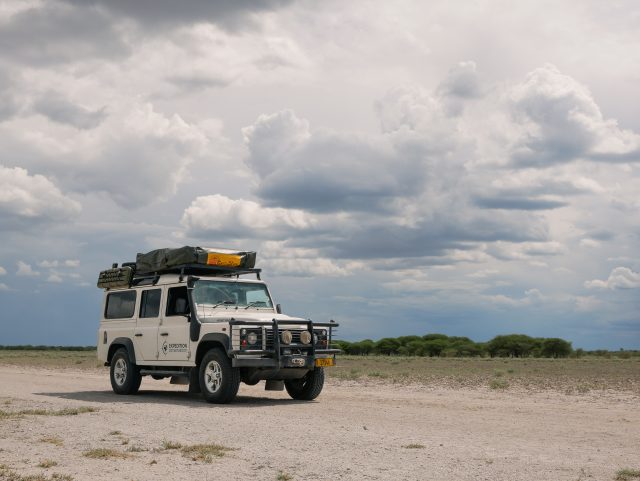
How did you begin traveling, and when did you decide that the overland lifestyle was to be a large part of your future?
Niina: When we met 12 years ago, we used every vacation to roam the globe, mainly backpacking in Asia and Central America before our first safari in Africa.
We had visited more than 30 countries together before catching the Africa bug while visiting Tanzania in 2015. We lost our hearts to this continent immediately and returned to explore Zambia, Uganda, Rwanda, and the DRC within the same year. It was also the turning point for overland travel: we wanted to figure out a sustainable way to travel through Africa on our own.
What motivates and inspires you to travel?
Niina: The goal of our African expedition is to help small wildlife conservation organizations with their marketing and fundraising. We love to spend time in national parks, learning more about wildlife behavior and habitat while trying to give back to these fragile ecosystems.
Traveling also brings a freshness of perception and a sense of freedom to our everyday life. Generally, we feel more alive and grateful when living on the road.
What is your life philosophy?
Piritta: Believe in your dreams and plan how to reach those goals. Begin by taking little steps towards making them a reality. And never give up! You can make it eventually—just keep trying for as long as possible. Don’t settle for a life that feels like the second-best option. You deserve the best.
Niina: Never compromise your authenticity and happiness but always be flexible and treat other beings with respect. Protect the vulnerable, be it the wildlife, environment, or people.
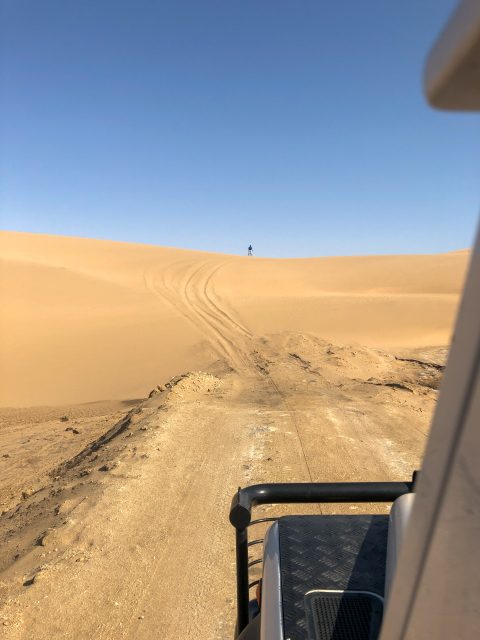
What are your favorite overland destinations so far?
Niina: We call Namibia our second home nowadays: it has unforgiving, magnificent, uninhabited wilderness areas, which appeal to us Finns. An excellent infrastructure, versatile natural attractions, and spectacular wildlife watching make Namibia a paradise for overlanders.
Then again, there’s something intriguing in every country. For example, we adore Mozambique for the jungle beaches, Eswatini and Lesotho for the challenging mountain tracks, South Africa for Kruger National Park, and Zambia for the off-the-beaten-path, waterfalls, and wildlife destinations.
Botswana has scored some of our wildest overlanding adventures: getting lost in the swampy tracks of the Okavango Delta, crossing the sticky salt pans of Central Kalahari after the wet season, and getting stuck in the mud pools in Moremi amidst the wildlife. It was also where we learned to share unfenced campsites with lions, leopards, hippos, elephants, hyenas, and wild dogs—at first, scary, but now the utmost luxury of this lifestyle.
How has traveling changed you?
Niina: We’re more resilient than before. We don’t panic easily when the Defender breaks down, a predator walks straight toward us with no escape routes available, or a pandemic hits the globe. Instead, we take the situations as they come and find a way of dealing with them.
We’ve learned that you can always make a plan, and there’s an inexplicable beauty in plan B (or C) when you’re brave enough to let go of your expectations. This is one of the most important lessons we have learned during our years of traveling overland.


How do you afford to travel?
Niina: At first, we sold everything we owned back in Finland, which wasn’t much, and lived off our savings.
Nowadays, we need to work to sustain this lifestyle. As we’re a duo of a wildlife photographer and writer, we craft articles for magazines and sell wildlife prints. We’re also working on a novel and a photography book. We return to Finland for a couple of months during the European summers to work as brown bear guides in the Russian border zone.
As the newest addition to our modest income stream, we’re launching exclusive photography safaris in Tanzania and Kenya, hoping to add more destinations in 2023.
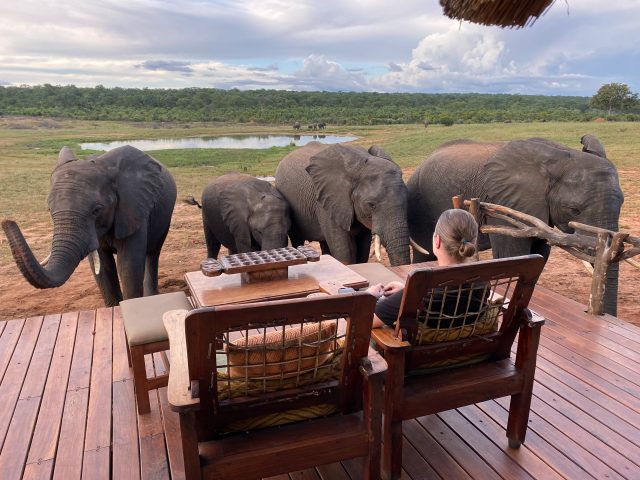
Travel dreams and goals?
Niina: Our original goal in 2019 was to drive from Namibia to the Arctic Circle to explore Northern Finland, Sweden, and Norway and then back to Namibia again. When the borders finally open, we want to take both the eastern and western routes through Africa.
Once we have completed it, our dream is to cross the Americas and perhaps Asia. As we’ve grown to love this lifestyle, we wouldn’t want it to stop!
What has surprised you the most about overland travel?
Niina: The cheerful and helpful community spirit amongst all overlanders, no matter the means of transport. Sometimes it feels like a family—one that you chose yourself.
Another incredible sense of freedom is that you always have complete control of living your life on your terms.
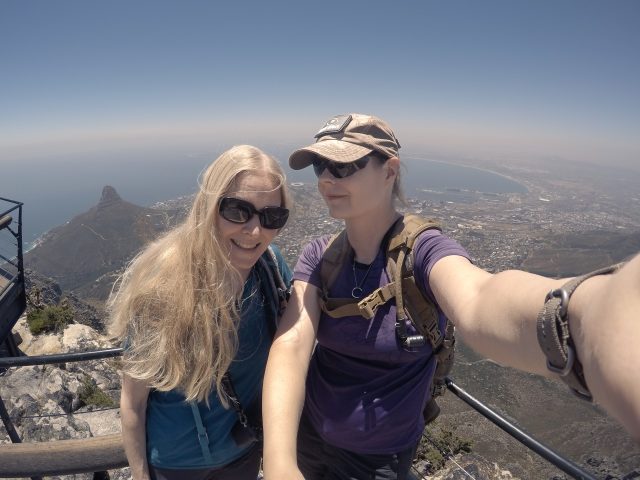
How has the pandemic affected your journey?
Piritta: When the Covid-19 lockdown began in early 2020, we were in South Africa. Our embassy ended up evacuating us, and we spent over eight months back in Finland. Our car awaited us in South Africa, and we immediately returned when it was possible.
Since we’ve been back, it has been challenging to travel, and we haven’t been able to make concrete plans; however, we’ve been pretty much “going with the flow,” constantly checking which borders and countries are open.
The paperwork, arrangements, and general costs have increased with all the PCR tests you’ll need to cross borders.
However, it has also been a rewarding time to travel since there have been fewer tourists around, and we’ve been able to enjoy much more intense and personal experiences, especially in the wild.
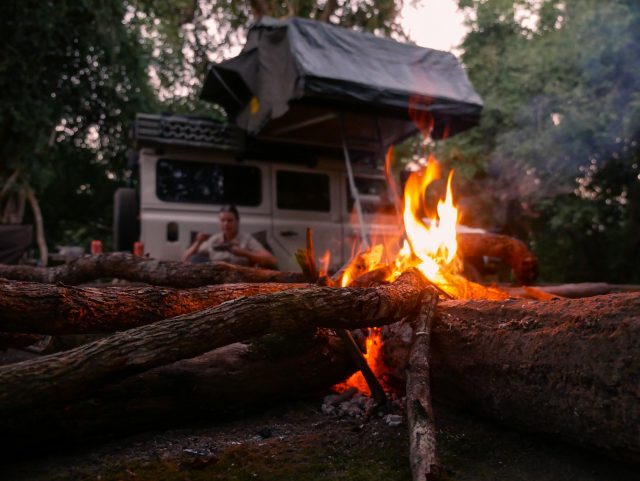
What challenges do you face daily when traveling as a couple?
Piritta: As we are traveling together, it means that we’re in each other’s company 24/7. It can sometimes be challenging and bring up conflicts on even trivial matters.
Two women traveling together can sometimes be as advantageous as a disadvantage. People are very interested in women traveling around independently most of the time, as it’s still an exception from the norm. But sometimes, we’ve also had suspicious attitudes, especially in religious and remote areas. We’ve never had any trouble. But then you just must read the situation and act accordingly.
How do you deal with living in such close quarters with someone 24 hours a day?
Piritta: When either one of us needs some time on our own, it may be hard to arrange, depending on the circumstances. But we’ve learned to cope with many different situations, and sometimes even an hour’s walk alone might do the trick.
You must be creative and make time for yourself differently than before. Sit alone and read a book for a while. Take a camera and go for a walk. Or take your laptop and work in silence on your own things.
Being together 24/7 doesn’t suit everyone, though. It will undoubtedly test your relationship, but it can also build your mutual trust and cooperation skills. A couple who survives all the challenges together stays together.
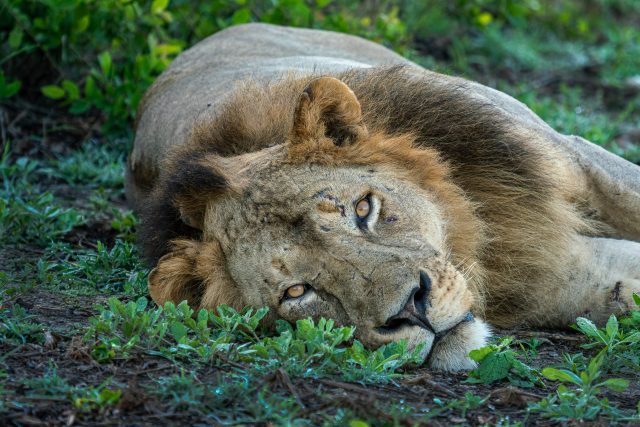
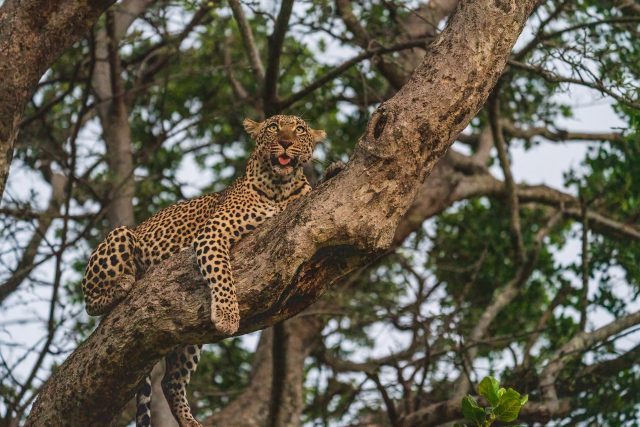
How could industry or infrastructure in Africa be more accommodating to overland travel?
Piritta: We’ve been overlanding in Eastern Africa for the last year, and sometimes the infrastructure for overlanding is seriously lacking compared to Southern Africa. There might not be any campsites in remote areas, and wild camping can be prohibited or tricky in densely populated areas.
So, we’d wish that more lodges would accommodate overlanders and build separate facilities for campers instead of offering us dirty staff showers and toilets—or no facilities at all. Also, prices are ridiculously steep here; sometimes lodges charge $15-20 per person for camping in a parking lot.
Are there any community resources that you rely on?
Piritta: Yes, we frequently tap into the very supportive and informative overlanding community. On WhatsApp and Facebook groups, you can pretty much get an answer to your questions about borders, visas, PCR tests, or any general travel or gear-related inquiries.
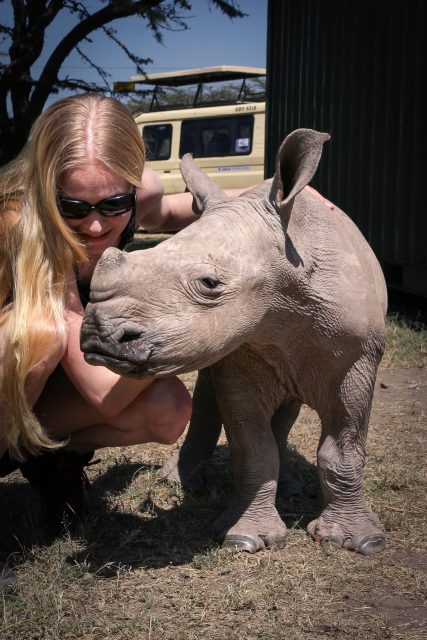
Are there any organizations that you support or promote while traveling?
Piritta: Yes, as we travel under the name “Expedition Conservation” and support many wildlife conservation organizations. Wildlife conservation has always been close to our hearts; we found a way to help causes dear to us through our skill sets.
We especially try to assist smaller organizations that don’t have big government or NGO funding. Usually, people haven’t heard of them, yet they’re doing vital work at the grass-roots level to conserve our natural habitat and its rich flora and fauna. We feel that these organizations will benefit the most from our help.
Would you like to share any tips or tricks?
Piritta: Make a rough plan for where, when, and how long you want to travel. But always be ready to change that plan on the fly, especially in these trying times. The more flexible you can be with your travels, the easier time you will have on the road.
Trust your instincts and always use your common sense. This will effectively keep you out of troubles way. But still, be ready to step away from your comfort zone because that’s where the adventure and personal development begin.
Try to take care of your physical health. Exercise regularly; all you need is your body and some time. Your physical and mental energy stays higher when you are in good shape, and your endurance for the inevitable stress and those long driving days is better.
Try to eat healthy, at least most of the time.
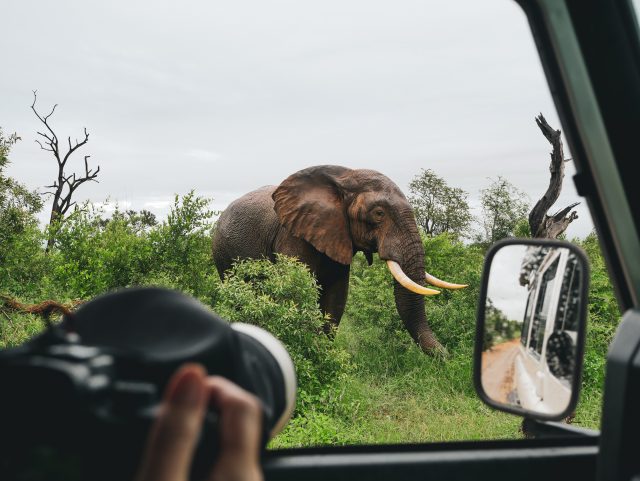
Favorite piece of gear?
Piritta: This is a tough one because we rely on some awesome stuff daily. Maybe one of the most favorites is a portable water filter system. Thanks to it, we never run out of clean drinking water and don’t necessarily need to buy bottled water. A 270-degree awning is unbeatable; rain or shine, it always gives you shelter.
Also, offline maps on our mobile phones are irreplaceable for navigating big cities and wilderness areas. We primarily use Maps.me and OsmAnd.
Niina: As we’re now traveling through some of the world’s best coffee-producing nations, we also carry a Hario coffee grinder and AeroPress for brewing a delicious cup each morning—one of the luxuries that would be extremely hard to give up.
What guidance can you give to women looking to travel?
Piritta: Keep your eyes open, and have situational awareness. Never be afraid to do something you’ve always wanted to. Trust yourself; you can do it.
Additionally, if you can and want, take some self-defense classes for a worst-case scenario. It may never happen (and hopefully won’t), but you won’t be totally helpless if things go south. We are accredited Krav Maga instructors and speak highly of it, but any effective self-defense or martial arts will do the trick. But even then, using your common sense is still the best advice. A self-defense skill is just the last resort.
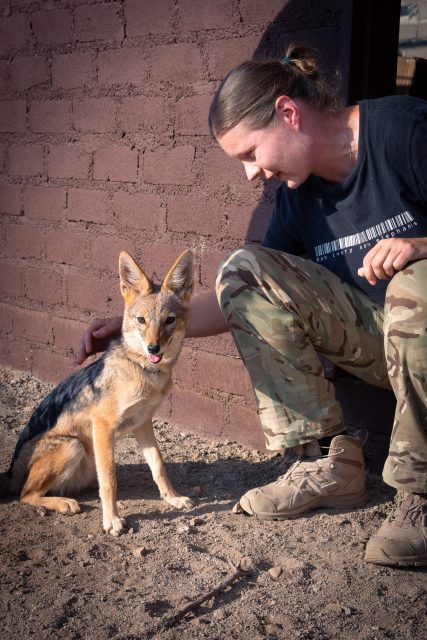
Tell us about your vehicle
It’s a Land Rover Defender 110 2.4 TDCi Puma. We call her Honey Badger, according to one of our favorite animals, mainly because a Defender is as tough as a honey badger.
Mileage?
At the moment, a little below 190,000 kilometers.
Fuel consumption?
It takes approximately 12 liters/100 kilometers on standard tar or gravel roads. Fuel consumption increases to about 13-15 liters by 100 kilometers when using low-gear and on demanding surfaces, like deep sand or mud. We’re always heavily loaded.
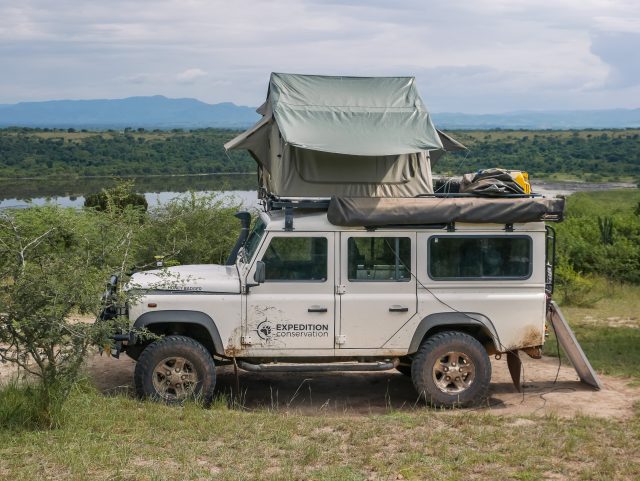
Modifications?
Long-range fuel tank, water tank, heavy-duty suspension, bullbar, extra headlights, snorkel, and a roof rack with a rooftop tent. The back seats have been removed, and there’s a storage system built in the back, which can be converted to a bed.
Future modifications?
We’re planning to further build the vehicle into a full camper, where we could always sleep inside the vehicle and give up the rooftop tent completely. We’re in the process of trying to plan a proper camper box that would suit the Defender 110 and survive both off-roading and corrugated gravel roads.

Regrets?
Piritta: A Land Rover Defender is not the easiest nor totally carefree car to own. It takes a lot of maintenance, and we have had to change many parts during the years. It sometimes takes many workshop visits to take care of things and a lot of time and money.
Sometimes, it makes us think that things might have been easier with a Toyota Hilux, just like every other bush mechanic tells us. Defender spare parts are expensive and complicated to source in Eastern Africa, especially for our 2.4 Puma model.
But then again, a Defender lasts decades when you take good care of it, and it can take you anywhere, being one of the most powerful 4×4 vehicles ever made. And we’ve also learned a lot about mechanics on the way and are always learning more. So, after momentary regrets, we’re still happy with our choice and wouldn’t change it for anything.
Website:
Social media:
Instagram: expeditionconservation
Facebook: expeditionconservation
Twitter: ExpConservation
Our No Compromise Clause: We carefully screen all contributors to ensure they are independent and impartial. We never have and never will accept advertorial, and we do not allow advertising to influence our product or destination reviews.


